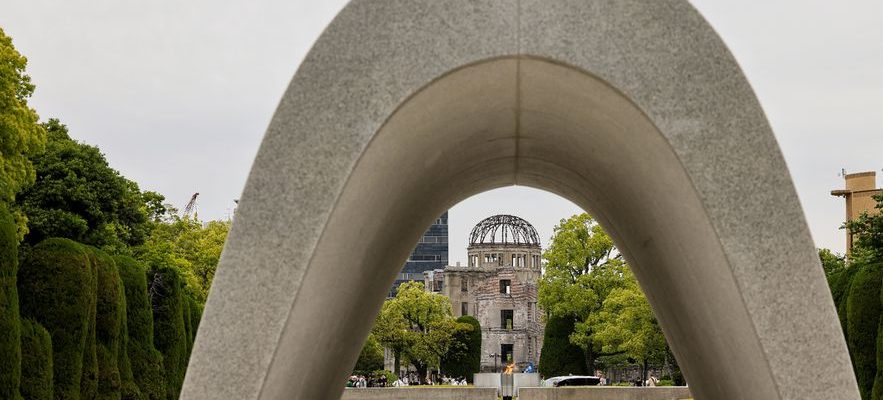The city of Hiroshima hosts the G7 summit with the slim hope that its calls for peace and the abolition of nuclear weapons will be heard, in a general context of an arms race linked to the war in Ukraine, the threat from North- Korea, and the pressure exerted by China around Taiwan.
The choice of this city wiped off the map in 1945 for this summit organized from May 19 to 21 is obviously highly symbolic. “As the turmoil in the international community reaches a historic level, I believe there is no other city more appropriate for such discussions,” said Prime Minister Fumio Kishida, himself a native of ‘Hiroshima.
The choice of this city wiped off the map in 1945 for this summit organized from May 19 to 21 is obviously highly symbolic. “As the turmoil in the international community reaches a historic level, I believe there is no other city more appropriate for such discussions,” said Prime Minister Fumio Kishida, himself a native of ‘Hiroshima.
The head of government is expected to guide other leaders, starting with US President Joe Biden, to the Peace Memorial Museum dedicated to the memory of the bombing and to meet the hibakushas (the survivors of the 1945 nuclear explosion) . “I hope they will become aware of the reality of the bombardment and share what they saw and heard,” said Toshihiro Toya, deputy director of the museum.
“It’s good that the leaders come to Hiroshima to feel the atmosphere of the place and discuss. It’s important to understand each other”, insists Sadae Kataoka, a 91-year-old hibakusha who continues to testify to transmit the memory of the bomb.
Expectations are all the greater in Hiroshima as the city has made pacifism and the denunciation of nuclear weapons a raison d’être. Shinzo Hamai (1905-1968), its first elected mayor in 1947, set it on this path by supporting the creation of Peace Park with its buildings designed by architect Kenzo Tange, and its “bomb dome” .
Discourse taken up by the younger generations
Surfing on strong hostility to nuclear weapons after the 1954 American test on Bikini Atoll, the city hosted the first international conference against atomic and hydrogen bombs in 1955, which attracted 2,600 participants from 15 countries. She created the Mayors for Peace network, which includes 8,256 municipalities around the world. His activism, carried by the hibakushas, led to the adoption, in 2016, of the UN treaty for the prohibition of nuclear weapons (ratified by 68 countries) – the nuclear powers however did not join it, no more than Japan. , which benefits from the American nuclear umbrella.
Time has passed but speeches of peace remain omnipresent in Hiroshima, and are taken up by the younger generations. The high school students designed a poster especially for the G7, featuring a dove flying away in an azure sky. “We want to share with the world the symbolic message of the devastation of war, and the abundance born of peace,” said Hiroshima Prefecture Governor Hidehiko Yuzaki. A point also underlined by the mayor, Kazumi Matsui who recalls that “the reconstruction of Hiroshima was only possible thanks to peace in the world”.
The Atomic Bomb Dome at the Hiroshima Peace Memorial, May 18, 2023 in Japan
© / afp.com/LUDOVIC MARIN
This attachment to peace sometimes translates into hostility to international meetings such as the G7. Braving the impressive police force mobilized for the summit, nearly two hundred people – a significant number for a demonstration in Japan – gathered on May 14 in front of the bomb dome, under a banner: “The G7 is not welcome”. Among them, Yukio Nishioka, child of hibakusha who called for honoring the wish of the survivors of the bomb to achieve the abolition of nuclear weapons. More radical, the pacifist activist, Suzuyo Takasato, deplored “the use of the city victim of the first atomic bomb in the service of the development of military capabilities”.
“I do not expect much from the G7. People come to Hiroshima to see the reality of the atomic bombings but continue to support nuclear weapons”, abounds Akie Onishi, also daughter of hibakusha, who nevertheless recognizes the importance for Hiroshima to remain mobilized. “All these calls for peace may seem hypocritical in the current context. But if Hiroshima, the first city destroyed by an atomic weapon, does not mobilize for peace and the abolition of nuclear weapons, who will?”.
